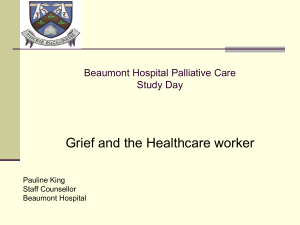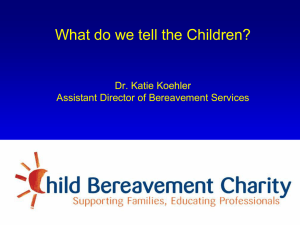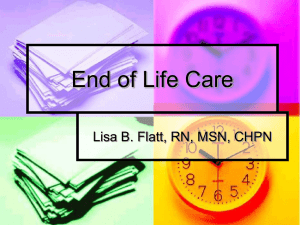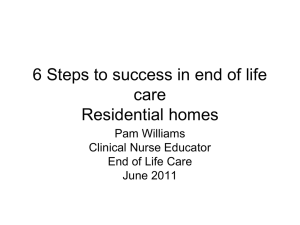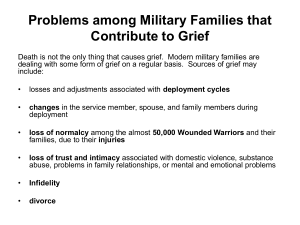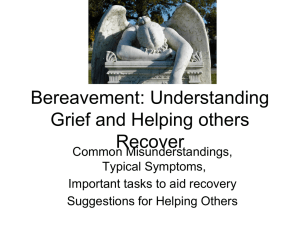coping with perinatal bereavement
advertisement
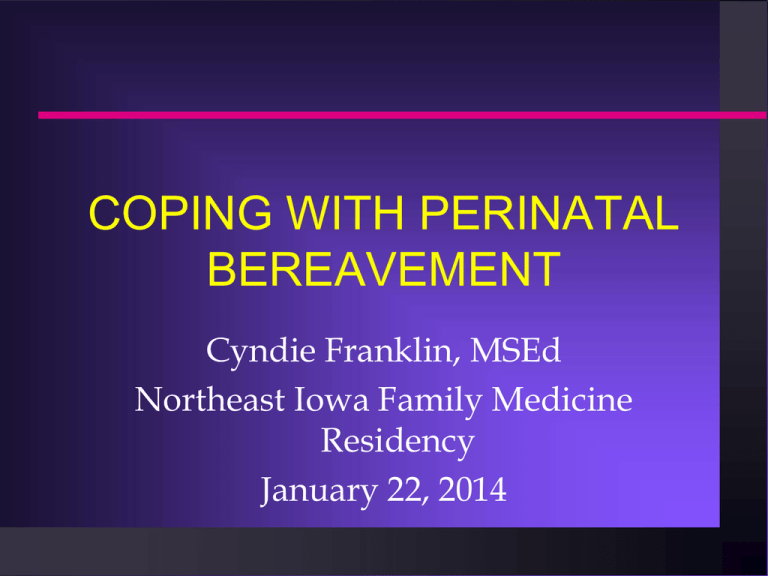
COPING WITH PERINATAL BEREAVEMENT Cyndie Franklin, MSEd Northeast Iowa Family Medicine Residency January 22, 2014 Objectives Improve understanding of the process of perinatal grief Discuss the role of the physician and/or healthcare professional in managing perinatal grief Provide information on local services available to patients and families About 15% of all pregnancies terminate in spontaneous abortion. At least 80% of those do so in the first trimester. Parents mourn for what was and for what might have been. Regardless of the stage of the pregnancy Regardless of the gestational age of the child Regardless of the length of the parental relationship Perinatal and early infant loss is complex because One must cope with their own grief. One must cope with their partner’s grief. One must cope with changes in the relationship because of the loss. Additional Stressors Parenting of other children Financial difficulties Lack of consensus as to a “proper” mourning period. Grieving always takes place within a social context. There are few mutually understood social rituals to aid the perinatally bereaved. Medical personnel are on the front lines of this family crisis. Understanding Grief Grief as a series of stages: Kubler-Ross model Parkes/Bowlby model Grief does not appear to be tied to a fixed order of emotional states. It seems to be a more complex and disorderly sequence of events than stage theorists suggest. Current thinking is that grief: Appears related to the closeness of the relationship with the deceased. Is impacted by the perception of preventability of death. There may not be final resolution of grief. Normal grief is normal for each person in its own way. “Losing someone you love is less like losing a very valuable and irreplaceable possession than like finding the law of gravity to be invalid.” --a Parent Time and Grief Time stands still Time’s up Doing Time Wasting time Looking back in time First times Time out Time heals Schwiebert, P from Grief Watch Newsletter, 2011 Perinatal loss disrupts parents’ assumptions of life: The meaning of the child Personal invulnerability Positive view of oneself and one’s child The belief in an orderly world Coping with grief requires a re-definition of “ normal.” Parents cope with their loss by: Establishing a sense of structure in their life. Gathering information about the experiences of others. Searching for meaning. Blunting and sealing. The Importance of Rituals Rituals are tools that help us make sense of loss Active participation in the grief process is the best way to cope with the loss of a loved one. (Kobler & Kavanaugh, 2007) Some rituals that may help Memory boxes Naming the baby Religious/spiritual contacts and practices Cultural/family traditions See, hold, touch the infant Take photographs Consider a funeral Collect mementos Journal or blog Helping Children Understand Children of all ages grieve They may not look like they’re grieving They often “re-grieve” a loss when they experience a new stage of cognitive development They may worry that they will die, too, or that they are to blame Some Ways to Help Them Understand Use simple, honest words about death Reassure them they are not going to die Tell them no one is to blame for the baby’s death Use age-appropriate books about death Help them find their own way to remember the baby Most couples will experience at least temporary marital conflict . This is largely due to an underlying disagreement in beliefs and expectations. Common differences experienced by couples Meaning each parent gives to the loss Each partner’s view of the couple Views of appropriate grief behavior Individual experiences surrounding the loss The marital relationship is re-stablized by: Communication Positive outlook on their relationship Perception of a shared experience Social support from outside the marriage is also important. Health care professionals play a pivotal role in healing. Physicians and health care professionals help by: Providing accurate information about what has happened about what to expect Information needs to be delivered in a caring and humane fashion Common support tactics that DON’T work include: Giving advice Encouragement of recovery Minimization of feelings Identification with feelings REMEMBER: The handling of the situation during the immediate impact of the child’s death will be vividly remembered by the parents! Take Home Points Perinatal loss is experienced as a real and significant event that is grieved by the parent(s) and family With support, most parents and family ultimately accommodate this loss As a healthcare professional, your actions and management of this loss make a difference in the process of grief Online Sources of Support http://www.mend.org http://www.mayoclinic.com/health/pregnancyloss/PR00098 http://www.babyloss.com http://marchofdimes.com http://facebook.com/pages/Share -PregnancyInfant-Loss-Support-Inc/112835372099879 Etc., etc. . .
